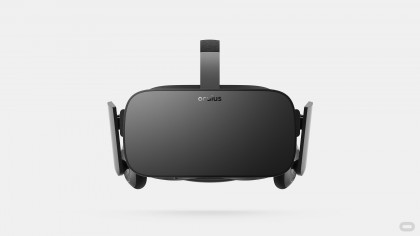Why Oculus isn't trying to be Nintendo when it comes to game development
And that nagging tether question
Sign up for breaking news, reviews, opinion, top tech deals, and more.
You are now subscribed
Your newsletter sign-up was successful

TR: I know you've been asked this before, but all the games I'm playing today, I can't help but note that Oculus Rift is tethered to a PC. Do you think it encumbers things at all?
PL: Of course. By necessity, with the tether, you have to design around the strengths and limitations of the headset. There's a few strengths: you have plenty of render horsepower, you can make really great games.
But that tether is a real thing that needs to be designed around right now. Game designers can't just pretend it doesn't exist because that's when people end up tripping over themselves and falling. You have to acknowledge that it's there for your game design.
Over time though, I think that's going to change. But, in the long run, virtual reality is primarily going to be headsets with built-in render horsepower. Now, that's not necessarily going to happen today because the fidelity is so much lower than what you can do with PC.
Gear VR is a great mobile device, but it isn't the same fidelity of what you can get on a PC. It's going to be a few years before we're able to get something that feels close to what we're showing today on a fully mobile device.
TR: Looking outside of gaming, what are you most excited to see when it comes to VR content or experiences?
PL: I'm really excited about virtual reality telepresence and social communication applications.
Sign up for breaking news, reviews, opinion, top tech deals, and more.
The thing to remember is that this perception of VR as a gaming technology is very recent. If you look at science fiction, gaming is usually either a tiny part of it or not part of it at all. Virtual reality is about building these parallel digital worlds that exist alongside our own, and living in them, working in them, playing in them, doing all kinds of things in them, games are just one part of that.
We believe that this was going to be the next major computing platform, maybe the last major computing platform
The reason we've seen this heavy focus on gaming is because, one, the only people who have the tools and the talent to make photorealistic, 3D real-time worlds are people in the games industry, so they were able to jump into this faster than anyone else. Hollywood and business you're starting to see catch up, though.
The other reason is people with high-end PCs capable of running high-end VR are mostly gamers right now, which means the people who can run the hardware are the people who want to buy game software.
That's going to change over time. I think you're going to see VR games continue to grow. It's going to continue to be a bigger and bigger industry. It's not going to shrink. But the other parts of VR are going to grow much more rapidly than games, to the point you start to see the balance that you see in science fiction films and books. You'll see people using it for business, basically replacing business travel, being able to put people from all over the world in the same room without burning jet fuel, without sticking them in different time zones. That's going to be a big deal.
TR: That sounds very Facebook-esque. Is Facebook influencing where you guys are going in any way?
PL: When Facebook acquired us, they agreed with our vision. Our vision has never been to just be a gaming company. The start is going to be very focused on gaming, but I've been a virtual reality enthusiast my whole life. I've always been really intrigued by the idea of virtual reality.
When we first started talking with Facebook, it wasn't about an acquisition. It was about ways that we could work together. It became clear that we both had very similar visions for virtual reality. We believe that this was going to be the next major computing platform, maybe the last major computing platform because once you have perfect VR, it's hard to imagine what other technology you need to perfect in terms of communication, content and experiences.
They're taking a long-term approach in this. Mark [Zuckerberg] has talked about Oculus being a 5-10 year investment, and we're doing everything we can to support that, making the right decisions for the long run rather than the short term.
TR: So, from where Oculus started to where it is today, has everything gone to plan? Are you still on the same path you wanted to go?
PL: No, it's been much faster. We're basically on the same path, I just didn't know that we were going to be able to move this quickly. I didn't know there were going to be nearly this many developers involved. I didn't know there'd be this many consumers interested, and I certainly didn't expect to see so many other large companies jumping into the VR space as a result of what we're doing. All of those have been a surprise. Path? We're pretty much doing exactly what we wanted to do.

Michelle was previously a news editor at TechRadar, leading consumer tech news and reviews. Michelle is now a Content Strategist at Facebook. A versatile, highly effective content writer and skilled editor with a keen eye for detail, Michelle is a collaborative problem solver and covered everything from smartwatches and microprocessors to VR and self-driving cars.